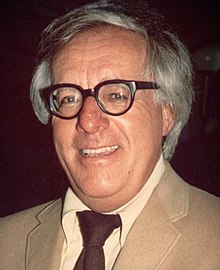Ray Bradbury | |
|---|---|
 Bradbury in 1975 | |
| Born | Ray Douglas Bradbury August 22, 1920 Waukegan, Illinois, U.S. |
| Died | June 5, 2012 (aged 91) Los Angeles, California, U.S. |
| Resting place | Westwood Memorial Park |
| Occupation | Writer |
| Education | Los Angeles High School |
| Period | 1938–2012[1] |
| Genre |
|
| Notable works |
|
| Notable awards |
|
| Spouse |
Marguerite McClure
(m. 1947; died 2003) |
| Children | 4 |
| Signature | |
| Website | |
| www | |
Ray Douglas Bradbury (US: /ˈbrædbɛri/ BRAD-berr-ee; August 22, 1920 – June 5, 2012) was an American author and screenwriter. One of the most celebrated 20th-century American writers, he worked in a variety of genres, including fantasy, science fiction, horror, mystery, and realistic fiction.[3]
Bradbury is best known for his novel Fahrenheit 451 (1953) and his short-story collections The Martian Chronicles (1950), The Illustrated Man (1951), and The October Country (1955).[4] Other notable works include the coming of age novel Dandelion Wine (1957), the dark fantasy Something Wicked This Way Comes (1962) and the fictionalized memoir Green Shadows, White Whale (1992). He also wrote and consulted on screenplays and television scripts, including Moby Dick and It Came from Outer Space. Many of his works were adapted into television and film productions as well as comic books. Bradbury also wrote poetry which has been published in several collections, such as They Have Not Seen the Stars (2001).
The New York Times called Bradbury "An author whose fanciful imagination, poetic prose, and mature understanding of human character have won him an international reputation" and "the writer most responsible for bringing modern science fiction into the literary mainstream".[4]
- ^ Cite error: The named reference
isfdbwas invoked but never defined (see the help page). - ^ "Inkpot Award". Comic-Con International: San Diego. December 6, 2012.
- ^ ""Mode" is replacing "genre" in critical terminology in order to broaden the range of critical discussion of specific types of literary expression. In the following link categorizing Victorian literature, "genre" is used for overall categories, such as poetry and nonfiction, and "mode" is used for particular kinds of literary types, such as realism and fantasy. Retrieved 28 February 2021".
- ^ a b Jonas, Gerald (June 6, 2012). "Ray Bradbury, Master of Science Fiction books, Dies at 91". The New York Times. Retrieved June 5, 2012.